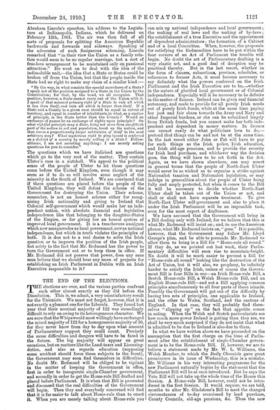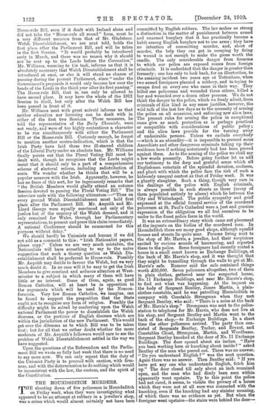THE END OF THE ELECTIONS.
THE elections are over, and the various parties confront each other almost exactly as they did before the Dissolution. This is, we admit, a very unsatisfactory result for the Unionists. We must not forget, however, that it is not exactly a pleasant one for the Liberals. They found last year that their nominal majority of 122 was exceedingly difficult to rely on owing to its heterogeneous character. We are sure that the Whips would most willingly have exchanged the mixed majority of 122 for a homogeneous majority of 30, for they never knew from day to day upon what amount of Parliamentary support they could count. Precisely the same difficulties and dangers will have to be faced in the future. The big majority will appear on great occasions, but on matters like the Land-taxes and Licensing- duties, and also as regards education (supposing some accident should force these subjects to the front), the Government may soon find themselves in difficulties. No doubt Mr. Redmond will be obliged to be vigilant in the matter of keeping the Government in office, first in order to inaugurate single-Chamber government, and secondly in order to get the Home-rule Bill drafted and placed before Parliament. It is when that Bill is presented and discussed that the real difficulties of the Government will begin. Then they and everybody concerned will find that it is far easier to talk about Home-rule than to enact it, When you are merely talking about Home-rule you can mix up national independence and local government ; the making of real laws and the making of by-laws ; the establishment of a true Executive and the appointment of dependent administrators; formation of a Cabinet and of a local Committee. hen, however, the proposals for satisfying the Redmondites have to be put within the four corners of an Act of Parliament the trouble will begin. No doubt the art of Parliamentary drafting is a very elastic art, and a good deal of deception may be practised thereby. But in the last resort, whether in the form of clauses, subsections, provisos, schedules, or references to former Acts, it must become necessary to say definitely what the powers conferred on the Irish Parliament and the Irish Executive are to be,--whether in the nature of glorified local government or of Colonial independence. Especially will it be necessary to be definite in the matter of finance. Ireland can be given real financial autonomy, and made to provide for all purely Irish needs out of purely Irish funds, while at the same time paying her just and fair share towards the Army and Navy and other Imperial burdens, or she can be subsidised largely from British funds, but you cannot make her both inde- pendent and dependent in money matters. In finance one cannot easily do what politicians love to do,— pretend that things can be and not be at the same time. In the last resort either John or Pat will have to pay for such things as the Irish police, Irish education, and Irish old-age pensions, and to provide the security for Irish land purchase, and whichever way the decision goes, the thing will have to be set forth in the Act. Again, as we have shown elsewhere, one may assert in general terms that the people of North-East Ulster would never be so wicked as to organise a strike against Nationalist taxation and Nationalist legislation, or may indulge in generalities about the people of Ulster being fully and amply protected, but when it comes to the Bill it will be necessary to decide whether North-East Ulster shall be taken out of the Union or not, and shall or shall not have separate treatment. To give North-East Ulster self-government and also to place it under the Irish Parliament will be an impossible task, even for the most expert of draftsmen. We have assumed. that the Government will bring in a Bill dealing only with Ireland, for we believe that this is what Mr. Redmond will insist on ; and, to use the American phrase, what Mr. Redmond insists on, " goes." It is possible, however, that the Government may follow Mr. Lloyd George's plan, and be able to persuade Mr. Redmond. to allow them to bring in a Bill for " Home-rule all round." If they do, as we pointed out last week, their Parlia- mentary difficulties will soon rise to mountain-height. No doubt it will be much easier to prevent a Bill for "Home-rule all round" looking like the destruction of the Act of Union, but it will also, we prophesy, be infinitely harder to satisfy the Irish, unless of course the Govern- ment Bill is four Bills in one—an Irish Home-rule Bill, a Scotch Home-rule Bill, a Welsh Home-rule Bill, and an English Home-rule Bill—and not a Bill applying common principles simultaneously to all four parts of these islands. Possibly the Government will get out of the difficulty by having two sets of principles, one applicable to Ireland, and the other to Wales, Scotland, and the cantons of England. In that case, they will probably find them- selves " slipping up " on the fact that appetite comes in eating. When the Welsh and Scotch particularists see how much more power Ireland is getting than they are, we shall be very much surprised if they do not insist that what is admitted to be due to Ireland is also due to them.
In what we have written above we have proceeded on the assumption that the first charge on the time of Parlia- ment after the establishment of single-Chamber govern- ment is to be the Home-rule Bill. If, however, we are to believe a statement made by Mr. W. L. Williams, the Welsh Member, to which the Daily Chronicle gave great prominence in its issue of Wednesday, this is a mistake. Mr. Williams in his very interesting programme for the new Parliament naturally begins by the statement that the Parliament Bill will be at once introduced. But be says the Veto Bill will not take up the whole time of the House this Session. A Home-rule Bill, however, could not be intro- duced in the first Session. It would require, we are told, months to alter Mr. Gladstone's Bill to meet the changed circumstances of to-day occasioned by land purchase, County Councils, old-age pensions, &c. Thus the new Home-rule Bill, even if it dealt with Ireland alone and did not take the " Home-rule all round " form, must be a very different measure from that of Mr. Gladstone.
Welsh Disestablishment, we are next told, holds the first place after the Parliament Bill, and will be taken in the first Session. " It would probably be introduced early in March, and there was no reason why it should not be sent up to the Lords before the Coronation." Mr. Williams, warming to his task, informs us that it is absolutely necessary that Welsh Disestablishment shall be introduced at once, or else it will stand no chance of passing during the present Parliament, since " under the Government's proposals it would only become law over the heads of the Lords in the third year after its first passing." The Home-rule Bill, that is, can only be allowed to have second place. It may have the whole of the 1912 Session to itself, but only after the Welsh Bill has been passed in front of it.
Mr. Williams next with great naivete informs us that neither education nor licensing can be dealt with in either of the first two Sessions. These measures, he told the representative of the Daily Chronicle, were not ready, and were of too highly contentious a character to be run simultaneously with either the Parliament Bill or the Home-rule Bill. Curiously enough, he forgot to mention another contra-indication, which is that the Irish Party have laid these two ill-starred children of the Liberal Party under an absolute ban. Mr. Williams finally points out that the Plural Voting Bill must be dealt with, though he recognises that the Lords might insist that it should only be a part of a comprehensive scheme of electoral reform, including redistribution of seats. We wonder whether he thinks that will be a popular measure with the Irish. Apparently, however, he has no fears of this sort, for he ingenuously remarks that " the British Members would gladly attend an autumn Session devoted to passing the Plural Voting Bill." The interview ends with the following ultimatum :—" Thus on every ground Welsh Disestablishment must hold first place after the Parliament Bill. Mr. Asquith and Mr. Lloyd George were equally convinced not only of the justice but of the urgency of the Welsh demand, and it only remained for Wales, through her Parliamentary representatives, to present and press this claim immediately. A national Conference should be summoned for this purpose without delay." We should hardly be Unionists and human if we did not add as a comment to this : " Irish Nationalist papers, please copy." Unless we are very much mistaken, the Nationalists will have something to say to the naive suggestion that such a thorny question as Welsh Dis- establishment shall be preferred to Home-rule. Possibly Mr. Asquith may decide to favour the Welsh, but we very much doubt it. In no case will it be easy to get the Irish Members to give constant and arduous attention at West- minster to a subject in which many of them will have little or no interest. Some of them, again, as good Roman Catholics, will at heart be in opposition to the arguments which will be used by the Noncon- formists. Very few Roman Catholics, we imagine, can be found to support the proposition that the State ought not to recognise any form of religion. Possibly the difficulty might be solved by conferring upon the Welsh national Parliament the power to disestablish the Welsh dioceses, or the portions of English dioceses which are within the jurisdiction of the new Parliament. This would get over the dilemma as to which Bill was to be taken first; but for all that we rather doubt whether the more moderate of Mr. Asquith's followers would care to see the problem of Welsh Disestablishment settled in the way we have suggested, Upon the questions of the Referendum and the Parlia- ment Bill we wrote so fully last week that there is no need to say more now. We can only repeat that the duty of the Unionist Party is to proceed with caution, with firm- ness, and with the determination to do nothing which would be inconsistent with the law, the custom, and the spirit of the Constitution.







































 Previous page
Previous page